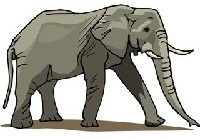 The Elephant Poem by John Godfrey Saxe (1816-1887)
The Elephant Poem by John Godfrey Saxe (1816-1887)

It was six men of Indostan
To learning much inclined
Who went to see the Elephant
(Though all of
them were blind),
That each by observation
Might satisfy his mind
The First approached the Elephant,
And happening to fall
Against his broad
and sturdy side,
At once began to bawl:
"God bless me! but the Elephant
Is very like a wall!"
The Second, feeling of the tusk,
Cried, "Ho!
what have we here
So very round and smooth and sharp?
To me 'tis mighty
clear
This wonder of an Elephant
Is very like a spear!"
The Third
apprached the animal,
And happening to take
The squirming trunk within
his hands,
Thus boldly up and spake:
"I see," quoth he, "the
Elephant
Is very like a snake."
The Fourth reached out an eager hand,
And felt about the knee.
"What most this wondrous beast is like
Is
mighty plain," quoth he;
"Tis Clear enough the Elephant
Is very
like a tree."
The Fifth, who chanced to touch the ear,
Said: "E'en
the blindest man
Can tell what this resembles most;
Deny the fact who
can,
This marvel of an Elephant
Is very like a fan!"
The Sixth
no sooner had begun
About the beast to grope,
Then seizing on the swinging
tail
That fell within his scope,
"I see," quoth he, "the
Elephant
Is very like a rope."
And so these men of Indostan
Disputed
loud and long.
Each in his own opinion
Exceeding stiff and strong,
Though each was partly in the right,
And all were in the wrong.
Literature and the Scientific Method
1. How does this poem illustrate the importance of observation in the scientific method?
2. What is the moral of the tale?
3. Many scientific errors can occur because the researcher does not use good skills of observation. Imagine a scenario where not being observant can result in an experiment going wrong. Describe this scenario in the form of a story or a poem.



